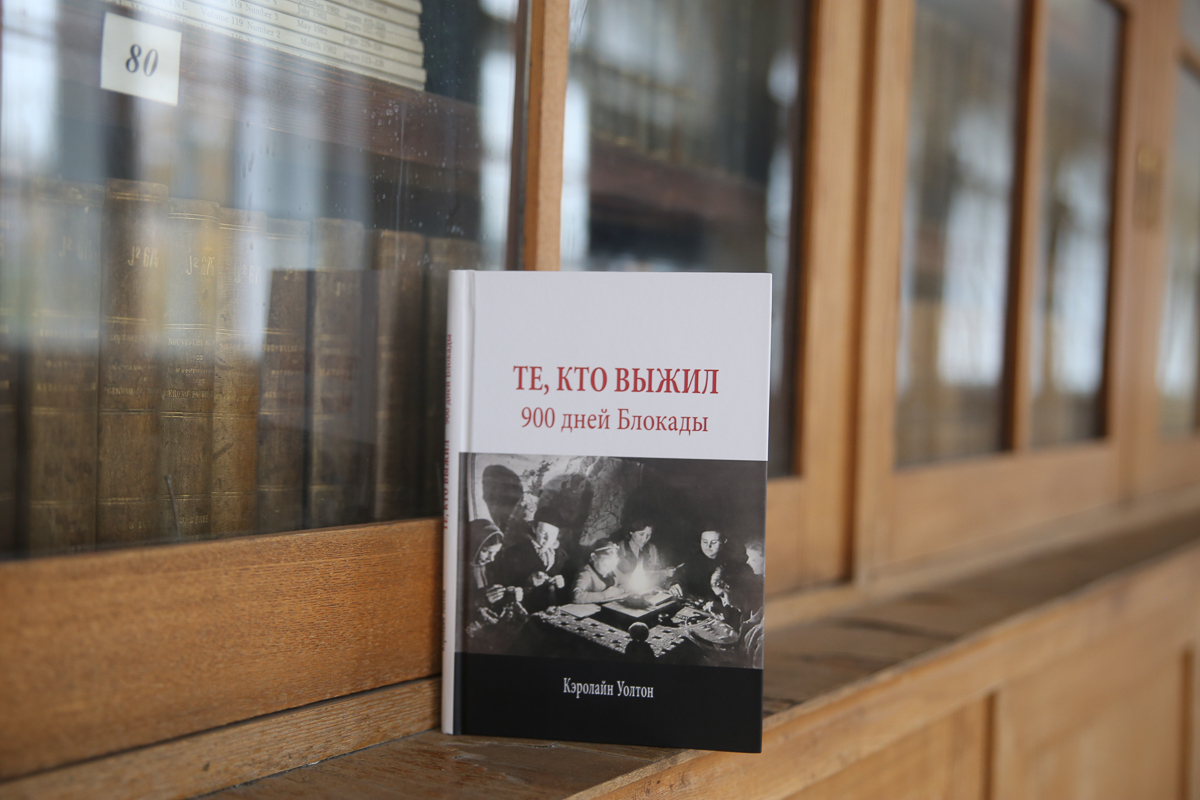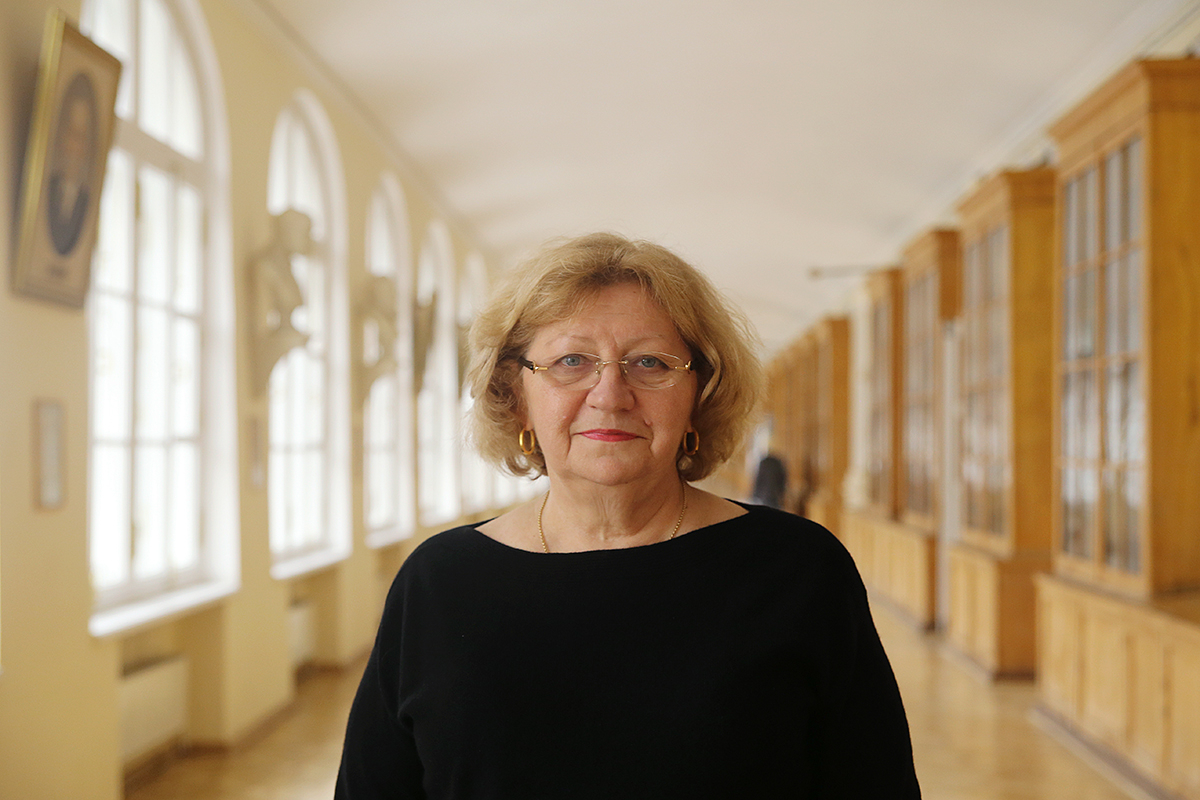Social Translation Centre: The Besieged. A Story of Survival by a British author Caroline Walton is translated into Russian
Among new releases in books in translation is The Besieged. A Story of Survival by a British author Caroline Walton. It was translated and prepared for publication by students in philology as part of their practice at the St Petersburg University Social Translation Centre.

We talked with Irina Baskakova, Head of the Social Translation Centre and Assistant Professor in the Department of English Philology and Translation at St Petersburg University. She told us about the project, a Russian and British reader’s response to the book, and clinical model of education in translation
Could you tell us how the Social Translation Centre began to translate The Besieged. A Story of Survival?
Such projects usually come unexpectedly. This was the case with The Besieged. A Story of Survival. Yet it was just as predictable since last year we marked the 75th anniversary of the end of the Great Patriotic War. There was a series of meaningful and significant projects to commemorate the event.
We have been long engaged with the St Petersburg Association for International Cooperation. The Association aims to promote knowledge and ensure that research and education benefit wider publics. Little wonder, it was the Association that launched an initiative to translate the book into Russian.
This project is unusual as there are few if any of such projects in Europe. Finding a foreign book originating in a foreign culture with a careful consideration to and special sympathy with the history of Russia is a stroke of luck. Caroline Walton has long been associated with our country. Although her parents had no family ties with Russia, they were truly enthusiastic about Russian history and literature throughout their life. If memory serves, Caroline visited Russia for the first time in 1979 and then travelled throughout Russia. Later she returned to Russia with a particular purpose and did a colossal amount of work. She found people who survived the siege of Leningrad and investigated their accounts of those gruelling days. They all had utterly different perspective on what they had to live through.
It is a nonfiction book reporting into a powerful account of actual events, occasionally challenging the border between fiction and nonfiction. As she was writing the book, it was becoming more and more engrossing. It is warm-hearted, with a ‘bit English’ view of our life, yet truly sympathetic.
Why was translating the book into Russian essential?
Such books are few and far between, books that are full of sympathy are even fewer. Caroline had a faith in what she was writing about. It is far from depicting a generic type in a conventional, simplified manner and recurring in fiction. What she narrates is based on true stories of those who survived.
Unfortunately, how this prolonged siege was mounted and lasted is now much distorted. Political discourse has a variety of opinions on whether defending Leningrad that claimed so many lives was justified. This is what makes The Besieged. A Story of Survival of great significance and value.
Could you tell us about how you translated the book? How many and what students were engaged in the project? How long did it take to translate the book? Tell us a bit more about project coordination and management.
A large-scale translation project means large numbers of students involved. As a rule, we engage students in our three master’s programmes in translation and interpreting. This project involved second-year master’s students in Simultaneous Interpreting (English). The project was part of their professional translation practice. Clinical model of education implies that the project follows a real-life translation cycle as in a translation agency. A translation team has a coordinator, an administrator, an editor, and translators. At the final stage, the translated text is edited by a head of the academic programme who is responsible for project coordination and management. The project took two months.
The Besieged. A Story of Survival was translated and edited by Bogdan Khristenko (coordinator-translator), Iulia Bardiuk (editor-translator), Vasilii Ermolin, Veronika Lyzhina, Kristina Nikulina, Anastasiia Pankratova, Svetlana Tkacheva, and Viktoriia Shilina.
The translated text underwent a review by experts upon acceptance to be published. There were no complaints. The translation was good. I am glad how our students did it.
You were engaged in the presentation of the Russian translation of the book in October. Could you tell us more about this event?
The presentation was well organised. The translation was presented by the St Petersburg Association for International Cooperation. The event brought together authoritative experts in the field. Even Caroline Walton delivered a report, although via Zoom. It was touching. She thanked everyone for assistance with the translation. What she was longing so eagerly since when the book was published in the UK has finally come true.
What are other projects of the Social Translation Centre today? What companies do you work with?
The Social Translation Centre was opened five years ago. During these years, we have carried out lots of projects. Some of them were challenging. It is hard to recall even some of the most significant projects. We collaborate both with external and internal partners. Among our external partners are children’s health charities. These texts are the most difficult to translate as they concern with serious childhood conditions and disorders. Also, among our external partners are non-profit organisation, e.g. museums, libraries, professional organisations, etc.) that need translation services.
We provide translation services in many languages: English (mostly); German; French; Spanish; and Italian. At the beginning of the year, we had a truly engaging project. A charity organisation needed translation in different languages of subtitles of the videos featuring the Paralympic sport events and competitions where Russian Paralympic athletes took part.
We translate texts of various register and on various subjects. We follow the model of a real-life translation agency. We translate fiction and documents, corporate charters and medical records, just to name a few. We also edit texts in foreign languages. For over two years, we have been editing large volumes of research articles prepared by the Arctic Centre.
Another engaging project was translation of online courses offered by St Petersburg University. Students chose online courses to translate some of the lectures. Today, the number of online courses is overwhelming, and enormous resources are needed to translate them. Additionally, we work with vulnerable citizens and University members, especially when it comes to documents or small texts. We worked with the Archive Clinic and the Institute of Philosophy at the University.
Could you share your plans for future?
Today, there is a new area of our work. This is school pupils. Our centre is just at the beginning of the process. Yet something has already been done. I won’t dwell much on this now. Hopefully, such projects will only benefit both school pupils and our students. We have occasional meetings with school pupils. Just recently we have visited the Saltykov-Shchedrin Library to meet them.
Contact the Social Translation Centre at perevod@spbu.ru.
or follow it in the VKontakte.
We also translate professional literature for our specific purposes. Among them are recently published monographs and articles. Students in Legal Translation are currently translating a recent monograph in forensic linguistics.
We are open for new collaboration opportunities and eager to take up new projects that inspire human feeling and kindness and keep our professional development continuous.


